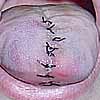
A Modified Man in the Air Force |
“Don’t ever go in the army Trey. A black man don’t got no place in the army.”
– Furious Styles, Boyz N the Hood, 1991
As those of you who read the BME newsfeed know, earlier this year the US military amended its dress code regulations to clearly ban certain types of body modification. Specifically, this included banning what it called “mutilation” — implants, split tongues, stretched ears, and so on. For example, the following was added to the Navy’s regulations:
8. Mutilation. Intentional body mutilation, piercing, branding/intentional scarring that are excessive or eccentric are prohibited. Some examples are (1) a split or forked tongue; (2) foreign objects inserted under the skin to create a design or pattern; (3) enlarged or stretched out holes in the ears (other than a normal piercing); and (4) intentional scarring that appears on the neck, face or scalp.
What you may not know is that those regulations were passed as a retaliatory measure against a small number of people in the military who were involved with heavy body modifications on their own time. Even though these activities hurt neither their performance or their commitment to the military or their country, nor did they reflect poorly on the military, these individuals were forced to have dangerous and damaging surgery to “correct” their body modifications.
BME had the opportunity to interview the airman that appears to have been the catalyst in this entire process. I’m keeping his identity anonymous here so as not to further endanger his chosen career. He is an IAM member though and I’d be glad to put other members in touch with him.
BME: What made you decide to join the military?
As far back as I can remember I either wanted to be in the Army or fly in the Air Force. Around ten my uncle would give me Army stuff from work — he was a Supply Sgt. in the Army National Guard. At around sixteen I learned that my chances of flying were slim to none… That and the fact that I wanted to get out of my parents’ house as fast as I could influenced my decision to join the Army.
Right after my junior year of high school I signed up for the Army Guard and did basic training, and then I did my senior year of high school. That way I could get the discipline — the discipline that I needed to keep my life from going down the drain.
After two years in the Army Guard I decided that I was not far enough from home — I needed more distance from my roots, so I went into the Active Duty Air Force in August of 2000. As it stands now I am preparing to go to Guam and then fifteen months later I will be in Fairford, UK.
And what made you originally decide to get a tongue splitting?
I had always been interested in heavier body modifications, and the research I did about tongue splitting showed me that:
(a) It was a way to move forward spiritually. I believe that all body modifications are an expression of what your mind thinks your body is (or should be)… Something akin to aligning your inner image of yourself with the outer image.
(b) It was a reversible procedure (or so I thought).
(c) It was not against any current military regulations.
(d) There was very little chance of complications and it heals quickly.
(e) It was easily hidden.
How did you actually do the procedure?
The procedure was done three times in total. The first time, March 16th, 2002, it was done by a friend using scalpel. Another friend recut it for me on August 1st, and then again on Christmas Eve of 2002, to cut out the regrowth using a cautery pen.
Did your tongue splitting affect your effectiveness as an airman in any way?
In my opinion I don’t believe that it negatively affected me in any way. I took leave for the procedure. When I went back to work I was talking normally and the people that I work with never had a problem with it.
Was it apparent to others?
Unless I showed you that it was split or if you were looking hard in the right light for the split you couldn’t tell. If you were looking for it, it looked more like a crease in my tongue than a split… Plus at work I didn’t show it off. If someone asked me I would usually tell them that I was not comfortable with that subject in the work environment.
Anyway, most of my fellow airman just wanted to know the usual questions that all modified people get. “Did it hurt?” “Why did you do that?” “How much did that cost?”… Stuff like that. I think we’ve all gotten the same questions at one point or another. Once they got the answers to their questions they seemed to accept it. I’ve never heard a fellow airman that has talked to me complain about it.
How did your CO find out about it?
The day after I got it done I went and talked to a “friend” who was also on leave. I went by his dorm room to pick up some stuff I’d let him borrow. He asked me why I was talking funny, so I showed him and asked him not to tell anyone at work.
I wanted to explain my reasons to work on my own time, but the next day he went out of his way to go in to work and tell my shop chief… Then it was a matter of the news travelling up the chain of command.
How did they respond at first?
The way that the military responds to most things that they cannot figure out… they “up channel it”.
By the time I made it off leave — only five days — it was already at 9th Air Force Legal. I won’t say how far past that it went but it went a lot further than I think anyone thought it would. After about three months of trying to decide out what to do they came down and said that there was no legal recourse that they could find, but the matter was still open.
On January 1st, 2003, a new regulation went into effect, a broad regulation that bans, among other things, tongue splitting.
What options were presented to you?
I really had no options. I was given a direct order by my CO to reverse it. I was given about forty minutes notice of this meeting, and then was told that in five hours I was going in for an evaluation. Then four days later I had another evaluation, and then three days after that I had the surgery. The only options I had were obey, disobey, or fight it via legal, which would have meant losing my orders to Guam.
Why do you feel the military felt so strongly about this?
I think they thought that I was sticking my nose up at that them, like I was daring them to try and do something about it… But that was not my intention at all — I just did it for me.
Why did you choose to reverse the split, rather than say, quitting?
Ever since I joined the Air Force I have wanted to do my twenty years and retire at thirty-seven. I’d have lost everything I’ve worked toward. If I have to bend for some new regulations to fall into line and complete this goal of mine, then so be it.
How was the reversal procedure and the subsequent healing?
The procedure was about an hour long. It was done under general anesthesia so I don’t remember any of it.
They cut all of the skin from the inside of my tongue and stitched it up with twelve stitches. I was out of work for a week with far more extensive pain and swelling than when I had the split done.
Four days after the surgery I noticed that I had a large loss of feeling and taste in the front of my tongue. I brought this up at my first check-up, and was told that it would be weeks before I got feeling back. When I went back for my two-week check-up, I brought it up again. The doctor said that it could be months.
It’s now been two months and while there has been some improvement, there is still a large loss of feeling and taste. I can feel the mass of scar tissue in the front of my tongue. Even though I am classified as “fully healed” I still have problems with it.
That doesn’t sound very nice at all…
I also have a shorter tongue and less movement in the front part. I have throbbing pains that would be best described as “ghost pains”. I also catch myself trying to move it independently as if it was still split, since that’s how it is in my mind.
Not only that, but in my work environment I feel I’ve lost some trust in the system. Normally, whenever there’s a change in a regulation the people that it affects get grandfathered, which is how it was when new tattoo regulation came out — they didn’t force everyone to have emergency tattoo removals. I feel that because I was just a single airman the military didn’t take grandfathering my case seriously.
If you’d known the problems the reversal would cause you, would you still permit them to do the reversal procedure?
It would have made me take a step back and think harder as to whether or not I should fight the ruling or not… I guess it depends on if I get full function out of my tongue back. I am in the process of seeing what legal options I have if full function does not return.
Did anyone appear to “feel bad” about forcing you
to undergo this procedure? What about when they saw the
aftereffects?
As far as the people that out-rank me I’ve not had any sympathy for any of the pain or on the issue of the fairness of the order. I was forced to return to work six days after my surgery when I still had stitches and a substantial amount of pain. I had to just sit at work for three days because I was not allowed on the flight line because I had such a bad speech impediment that I couldn’t use a radio.
When I came in with stitches my supervisors said that it looked really “sick” and told me not to show them again. Now most of my supervisors say you can’t tell that I ever had it done — when I tell them that I can tell on account of having no feeling in my tongue they just dismiss it.
How did your fellow airmen react to the reversal?
Most of the people that know me or of my case thought it was wrong of the military to force me to reverse it. A few have had the attitude of “you should have known that this was coming when you first did this”, but they’re a very small minority.
I’ve also had a few that wanted to help me fight this, going so far as to start writing letters to the Air Force Times. Out of fear of backlash to my fellow airmen I asked them not to do that. Overall most people simply say that the military should have grandfathered me.
What would your advice for “the modified” also interested in a military career be?
I’ve never suggested someone should get into the military. It’s a personal choice. If you want to get into the military and don’t have any tattoos showing on your forearms or above the collarbone, then you’ll be welcomed as any non-modified person would. If you’re into piercings on the other hand, you’ll be ridiculed until you either take the piercings out or learn to deal with the ridicule.
Note that when I say “piercings” I mean those that can’t be seen; piercings below the neck. In the Air Force you can have holes in your lobes. You just can’t wear jewelry on base.
For people into the heavier side of body modifications I’d tell them to stay away from the military. If you get modified after you enter the military then you’ll be in violation of their rules and regulations. If you’re modified before the military they probably won’t let you into the service anyway.
All that said, do you personally support the military’s new regulations on body modifications?
I don’t see how I can support a regulation that was unfairly enforced on me. So personally, no, nor do I support them from a professional point of view. I was not treated fairly.
I believe that these regulations are too broad and too open to interpretation. Now anything that makes you look anything other than, as I say, “Christian Conservative”, can be considered violating a regulation. It’s up to the commander to decide whether or not it’s violation…
Does the military in general consider the bodies of its staff its “property” to surgically alter as it sees fit? That is, does this attitude manifest itself in other ways as well?
The military sees its personnel as government property. They can’t force you to get procedures, but on the other hand, the military is not forced to keep you either, nor are they forced to give you an honorable discharge if you decide not to get a procedure that they want you to get done.
Almost every person in the military is told that if you get a sunburn bad enough to stop you from wearing your uniform that it’s “destruction of government property”.
Do you know if this has affected others in the military?
Yes, it has… I talked to a fellow IAM member that is the Marines about this who had similar issues. Also, the new regulations forced an airman at my base to remove his 000 gauge plugs in his lobes so that they shrink back down. He never wore them on base though. Even though he did not break the regulation he had the same choice as to whether or not to fight as I did… And he made the same choice I did. He now has about a 6 gauge hole. So as to not get into trouble if someone sees him he wears a small mall-bought post in it.
Thank you for talking to us, and good luck in Guam.
 DAY ONE |
 DAY TWO |
 DAY SEVEN |
 DAY EIGHT |
 DAY 36 |
“The modified” are a fascinating cultural group. We span all religions and political leanings, and, unlike race, we actively choose this path. While some would argue that we are born into it, just as people are born into a sexual orientation, I would argue that all humans are born with the innate desire to self decorate and explore and enhance themselves and the world through body modification — most people are simply too repressed and afraid. In any case, before I get off track, on many levels we are a distinct cultural group and it’s important that we learn to think and act as such when we need to.
Farrakhan and other minority revolutionary leaders often refer to the military as “the white man’s army”. What I think is meant by that, on a more general level, is that the military exists to defend a certain mainstream status quo, rather than to protect the interests of minority and subcultural groups that don’t have massive representation in the governance of the nation. As such, these leaders hold that when minorities enter the military, they may be fighting to keep empowered a group that does not act in their best interests.
I can’t say whether “a black man has no place in the white man’s army”, but I can tell you with certainly that “a modified man has no place in the unmodified man’s army” — you don’t even have to take my word on it. It’s the law! They’ve illustrated through forcing this involuntary surgery to “make normal” the appearance of their staff that they’re willing to go to extreme lengths to destroy freedom of the body. That says to me that all modified people, and all people who care about the rights of the modified should seriously consider whether it is in their best interests to assist in a military-industrial complex that seeks to destroy us.
“Seeks to destroy us”…
It seems like a crazy statement, doesn’t it? But we’ve just watched one of our friends get a body modification that brought him closer to spiritual fulfillment and enriched his life… Then we watched the government step in and offer him two choices: (a) the end of his life as he knew it, or (b) surgical destruction of something he loved and had enhanced his life.
This isn’t the place for me to be making larger sweeping statements about the military — my pacifist attitudes on that subject are no secret to readers of my IAM page. However, I do need to point out that a nation’s military on some level must represent the will and the face of its people. What message is being sent by these acts and these regulations to the people of America, and, since America imposes its military might — and the culture it espouses — on the world, what message is being sent to the modified people of the world? What freedoms are being protected, and what freedoms are being trampled?
Think about it,

Shannon Larratt
BMEzine.com
 BME/News and Modblog highlight only a small fraction of what BME has to offer. Take our free tour and subscribe to BME for access to over 3 million body modification related photos, videos, and stories.
BME/News and Modblog highlight only a small fraction of what BME has to offer. Take our free tour and subscribe to BME for access to over 3 million body modification related photos, videos, and stories.